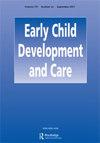Associations between the well-being of the early childhood education workforce and caregiver-child relationships in centre- and home-based settings
IF 1
4区 心理学
Q3 EDUCATION & EDUCATIONAL RESEARCH
引用次数: 0
Abstract
ABSTRACTThe purpose of this study was to (1) explore demands and resources among centre-based and Family, Friend and Neighbor (FFN) early childhood education (ECE) caregivers, and (2) investigate how these factors are associated with the quality of caregiver-child relationships. ECE caregivers (n = 257) completed a survey that assessed demands, resources, and the quality of caregiver-child relationships. Analyses included univariate and bivariate analyses and hierarchical linear regression modelling. Centre-based caregivers (n = 173) reported higher stress, less knowledge related to wellness, and lower confidence related to self-care practices compared to FFN caregivers (n = 84) (all p < .05). Mindfulness was associated with higher reported closeness with children in their care (p < .05). Centre-based caregivers may experience more demands and less resources compared to FFN caregivers which could impact the quality of care. Mindfulness strategies may help to mitigate demands and bolster the well-being of ECE caregivers and healthy early childhood development.KEYWORDS: Early childhood developmentmindfulnessmental health promotion Disclosure statementNo potential conflict of interest was reported by the author(s).Data availability statementData is available from the authors upon request.Additional informationFundingThis work was supported by the Temple Hoyne Buell Foundation, The Colorado Springs Health Foundation, and the Colorado Health Foundation (no grant numbers).Notes on contributorsCharlotte V. FarewellDr. Charlotte V. Farewell is an assistant professor with the Rocky Mountain Prevention Research Center and Director of the Population Mental Health and Well-being concentration at the Colorado School of Public Health. She implements interventions rooted in community-based participatory research as well as research and evaluation projects that utilize a unique combination of mixed methods in national and international settings. Dr. Farewell leads intervention projects which focus on promoting the well-being of low-resourced population (e.g. pregnant and postpartum individuals, early care and education caregivers).Lisa D. GonzalesLisa D. Gonzales is a senior health promotion coordinator with the Rocky Mountain Prevention Research Center. She is responsible for implementing early childhood interventions and participates in partnership meetings to continue fostering academic-community partnerships.Alicia PrivettAlicia Privett is a Master of Public Health who supports this early childhood work by conducting interviews, analyzing data and engaging in oral and written dissemination opportunities.Emily MaiurroEmily Maiurro is a senior professional research assistant and research manager of early childhood work at the Rocky Mountain Prevention Research Center. She oversees the implementation of all programmatic components and supports data collection and reporting activities.Jini E. PumaJini E. Puma is the associate director of the Rocky Mountain Prevention Research Center and the principal investigator for the RMPRC School Wellness Program (SWP) and the Text2LiveHealthy (T2LH) program. She is the Co-PI on the following three research studies focused on early childhood educators: Fostering Resilience in Early Education (FREE), Linking Systems To Address ACEs Early On (STANCE) and Workforce in Low-resource Locations (WELL).幼儿教育工作人员的福祉与以中心和家庭为基础的照料者与儿童关系之间的联系
摘要本研究旨在(1)探讨中心型和家庭、朋友和邻居(FFN)幼儿教育(ECE)照顾者的需求和资源,(2)探讨这些因素与照顾者-儿童关系质量的关系。ECE照顾者(n = 257)完成了一项调查,评估了照顾者与儿童关系的需求、资源和质量。分析包括单变量和双变量分析以及层次线性回归模型。与FFN护理人员(n = 84)相比,中心护理人员(n = 173)报告压力更高,健康相关知识较少,自我护理实践相关信心较低(均p < 0.05)。正念与报告中与儿童的亲密程度有关(p < 0.05)。与FFN护理人员相比,中心护理人员可能会遇到更多的需求和更少的资源,这可能会影响护理质量。正念策略可能有助于减轻需求,加强幼儿教育照顾者的福祉和健康的幼儿发展。关键词:幼儿发展正念心理健康促进披露声明作者未报告潜在的利益冲突。数据可用性声明数据可根据要求从作者处获得。本研究得到了Temple Hoyne Buell基金会、科罗拉多斯普林斯健康基金会和科罗拉多健康基金会的支持(没有资助编号)。作者简介:夏洛特·v·永别了Charlotte V. Farewell是落基山预防研究中心的助理教授,也是科罗拉多公共卫生学院人口心理健康和幸福中心的主任。她实施植根于社区参与性研究的干预措施,以及在国家和国际环境中利用混合方法的独特组合的研究和评估项目。Farewell博士领导的干预项目侧重于促进资源匮乏人群(如孕妇和产后个体、早期护理和教育护理人员)的福祉。Lisa D. Gonzales是落基山预防研究中心的高级健康促进协调员。她负责实施儿童早期干预措施,并参加伙伴关系会议,以继续促进学术界与社区的伙伴关系。Alicia Privett是公共卫生硕士,她通过进行访谈、分析数据和参与口头和书面传播机会来支持这项儿童早期工作。Emily Maiurro是落基山预防研究中心儿童早期工作的高级专业研究助理和研究经理。她监督所有方案组成部分的实施,并支持数据收集和报告活动。Jini E. Puma是落基山预防研究中心的副主任,也是RMPRC学校健康计划(SWP)和Text2LiveHealthy (T2LH)计划的首席研究员。她是以下三项针对幼儿教育工作者的研究的共同负责人:培养早期教育的弹性(FREE),连接系统以解决早期ace (STANCE)和低资源地区的劳动力(WELL)。
本文章由计算机程序翻译,如有差异,请以英文原文为准。
求助全文
约1分钟内获得全文
求助全文

 求助内容:
求助内容: 应助结果提醒方式:
应助结果提醒方式:


